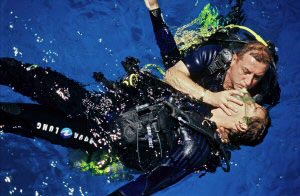Rescue Diver
Get ready for a course that is described by many divers as fun, demanding, rewarding and, ultimately, the best course they’ve done.
Part of the fun is that your Divemasters will be acting out the scenarios where they play the victims, something they love to do, but as a whole many divers feel they have received the most practical know-how and emergency preparation from this course.
Expand on what you know and equip yourself with the knowledge to prevent and deal with problems that can occur when many metres under water.
Learn to look after your fellow divers and increase your confidence in sticky situations that may come up when diving.
WHO is up for adventure?
Can you handle an underwater emergency? Are you calm in the face of danger?
If not, you can learn how to be by qualifying as a Rescue Diver with PADI!
This course is for any Open Water/Advanced Diver that’s ready for a rewarding challenge and wanting to take that next step to becoming a valuable member of the diving team.
You’ll need to have completed a CPR certification within the last 2 years, such as a Primary and Secondary Care course including CPR and First Aid.
Not PADI certified?
Not a problem! PADI often accepts equivalent qualifications from other recognized diving organizations.
WHAT will I learn?
In the Rescue Diver course you’ll learn to:
- Manage emergencies and equipment
- Recognise and manage stressed divers
- Rescue yourself
- Rescue panicked divers
- Rescue unresponsive divers
WHERE will it take me?
The Rescue Diver course is the entry ticket to all the other exciting Professional certifications starting with the Master Diver qualification. All divers wanting to qualify further will need to be Rescue Diver certified as a prerequisite.
WHEN will I be ready?
In just 3 days, you could be the proud holder of a PADI Rescue Diver certification! The course consists of one theory day and two practical days when you’ll complete five dives to qualify.
Eager to Start? Try PADI’s E-Learning
The Rescue Diver certification is the most recent course to be added to PADI’s E-Learning possibilities. This means that you can start learning the theory before you do your practical rescue dives, allowing you to go along at a pace that suits you in your own time.
WHY should I be excited?
Put your diving skills to the test and rise to the next challenge in the exciting underwater sport of scuba diving. The Rescue Diver course contains a great deal of serious subject matter – life and death situations underwater and ways to prevent them – but it is also a great deal of fun and a must-do for any diver considering advancing to the next step of Dive Master.HOW do I do it?
If you’re an Open Water Diver, sign up for the confined practical
rescue training and knowledge development counterparts of the Rescue
Diver course while you complete your Advanced Open Water qualification.
Emergency First Response
Having the knowledge and skills to help out in an emergency is a great skill to have, and makes you an asset to any situation or organization.
In fact, most PADI diving instructors are also trained instructors for Emergency First Response.
WHO is up for adventure?
Anyone! You don’t even need to be a scuba diver to do PADI’s affiliated Emergency First Response course and the course is available to all ages too.
Many PADI scuba divers choose to take these emergency training
courses to meet the prerequisites for continuing their PADI certifications,
for example if they want to become a Rescue Diver or Divemaster,
but have also found many uses for these skills in non-diving situations.
WHAT will I learn?
With the Primary and Secondary Care course you’ll learn:
- How to administer CPR and rescue breaths (Basic Life Support)
- How to use breathing barriers to reduce the spread of disease
- How to administer basic first aid and what is needed in a basic first aid kit
- How to prevent and care for victims experiencing shock
- How to deal with spinal injuries
- How to use an AED (Automatic External Defibrillator) in an emergency
WHERE will it take me?
Emergency First Response offers more than just the Primary and Secondary Care courses, so you could continue your learning with extra emergency training courses such as Care for Children.
WHEN will I be ready?
Although it is of course class-size dependent, you could be trained by Emergency First Response in as little as 6 hours.
WHY should I be excited?
EFR (Emergency First Response) is fast becoming one of the world’s best training organizations for CPR, First Aid and AED training.
You’ll be in good hands as the Primary and Secondary Care courses with EFR are well-known for easy-to-understand training components. At the end of the course you’ll know how to care for patients of different ages (infants, children and adults) and how to work an Automatic External Defibrillator (AED).
There’s also a great First Aid at Work component of the course.
HOW do I do it?
The Emergency First Response course comprises independent studying as well as practical, hands-on practice.
You’ll learn all about how to care for patients in an emergency situation, but you won’t need to be a trained paramedic to understand all the aspects of the course as they’ve been specially designed for lay rescuers.
Once you complete the Rescue & EFR courses, you can continue with the Divemaster internship or the Master Scuba Diver course or the Tec diving courses.
Contact us to Book your Rescue & EFR Courses.

